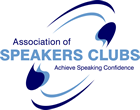Tips and Guides - Subscriber only content
This section goes beyond the guide and provides handy tips to help you along.
Preparing a Speech
- The basis of any speech is in its preparation. The amount of preparation will depend on your level of experience, how well you know the material and they type of content. Initially chose a subject you know well that flows easily from one section to another. Preparation is required on how you will delvier the material, for example, whether any audio visual aids are required. Use of multimedia technologies such as MicrosSoftİ PowerPoint and Prezi are very common and we have a separate section dedicated to effective use of these media. (How NOT to do Death by Bullet Point).
The effectiveness of any speech will depend on the preparation you put into the speech itself and into your delivery on the day. Read more on Preparing a Speech.
Quick Reference : Preparing a speech checklist
Mentors
Practice
- Sadly there is no silver bullet for learning to speak. It does take practice. But like anyone who has applied themselves to learning a musical instrument, practice reaps benefit. The brain is an incredibly plastic organ capable of adapting and reacting. Regular practice of the right sort will affect a strong and enduring change in ability and behaviour. One of the exercises we use at Speakers Club is the Topics Session. No preparation is required for topics. The chairman will give you a topic to talk about, usually with some kind of theme to give you some ideas to start with. Topics can feel like being thrown in at the deep end at first so it's important just to have a go and build up a little each time. It's great experience for thinking on your feet which is what happens in real life all the time. The topics leader will be sensitive to your level of experience and to what he knows about you. We have all sorts of tips and techniques to make sure that you never feel lost for words and will soon be delivering 2 minute topics with no trouble at all. We often find it difficult to shut speakers up after their allotted two minutes !
You'll need to deliver a speech for each of the above assignments reaching a certain level of ability before moving on.OK - so those are really the basics, now all you need to do is put it all together, simple right? Of course not. Learning to speak and communication more effectively and confidently is like learning anything new. We go through four phases until we fully grasp each skill. Acquiring skills of course comes with regular practice and feedback and eventually our brains mould themselves to the task in hand so that we can function almost self consciously and then attend to other things. What initially felt like juggling or spinning plates becomes much more comfortable. You might want to consider leaning to juggle too, great fun once you have the hang of it. Then try rehearsing your speech whilst juggling. Once you've mastered that then speaking on its own becomes a doddle.
Of course there are different speaking challenges but you will become more able to draw on the skills acquired from the assignments and use them to best advantage. Practice is still key at this point until you reach increasing levels of confidence. You may have initially taken days or weeks to put together a speech at the start of the guide. As you progress you will find that it takes you less and less time and that a lot of what you did before becomes more automatic and less conscious. This in itself reduces the perception that speaking is costly and painful process.

